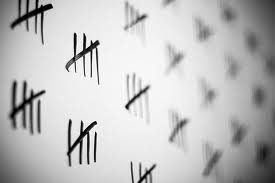What’s one way you can keep score of your habits. You know, the ones you’ve determined to be important to your goals and their achievement in 2015. Before you answer, let’s do a quick exercise to put it into perspective.
Picture this… you’ve set a goal and your commitment level is 10. You’re very excited and truly believe that this time, unlike all the other failed attempts in the past, this time you will get rid of the weight you’ve committed to lose. You feel so powerful and so unstoppable at this point.
But think about it. Isn’t this how you felt every other time too? Each time you discovered a “new diet” or “new method” for losing weight, you actually felt the same positive emotions.
So what’s different this time? Could it be that this time you put your goal on paper, and reinforced it with “WHY-power”?
If so, I commend you! But you’re not done. If you haven’t determined your “WHY”, you may be in for another failed attempt. So go back and figure out WHY you want to accomplish this goal, this time, and what it will cost you if you don’t. You can click here to jump back to last week’s post on the importance of your “WHY”.
After you’ve figured out your “WHY”, I’m going to recommend another step to help you stay successful. What is it? It’s called “tracking”. In fact, you probably do some form of tracking in your life. But you’re just not conscious of it, or maybe you call it something else.
So what is “tracking”? In a nutshell, it’s a great way to find out where you currently stand. Tracking brings your choices, decisions, habits, and behaviors to your conscious awareness by allowing you to “keep track” of the things you want to start doing, stop doing, or continue doing.
 Here’s how: Let’s say you want to lose 30 pounds. Then keep a small notebook with you and write down (track) everything you put in your mouth. This includes every meal, beverage, snack, candy, cocktail… Everything!
Here’s how: Let’s say you want to lose 30 pounds. Then keep a small notebook with you and write down (track) everything you put in your mouth. This includes every meal, beverage, snack, candy, cocktail… Everything!
Why everything? You want to lose 30 pounds, right? Well, until you know what you’ve been eating and all that’s contributing to your weight issue or current status quo, you’re gonna have a tough time shedding that extra weight. Tracking will help you see what you’ve been eating so you can identify ways to improve.
How long should you track? You need to give yourself a little time so stay with me on this. The first week is to help you learn about your eating habits. Let’s assume that if you’re 30 pounds overweight that you’ve picked up some bad habits along the way. And until you bring some conscious attention to your nutrition, accomplishing your goal is not going to be easy. After all, we’re not talking about a diet here. You are creating new healthy habits and a new long-term lifestyle. This requires time, focus and effort; and some discipline.
You may find through tracking that you’re consuming a few sugary beverages every day. That’s easy to eliminate. Or maybe you reach for a low nutrient, high calorie processed snack every afternoon or evening. How about extra or over-sized portions? That will be uncovered. And don’t forget about alcohol. Talk about empty and unaccounted for calories. They all add up, and it’s virtually impossible to know until you get a grip by bringing awareness with tracking.
Now that you have 7 days of data, you can begin to evaluate your choices. Some will be obvious that you’ll want to stop immediately. Others can be replaced with healthier alternatives. And you may also want to consult with a Registered Dietitian to help you develop meal plans that align with your new healthy lifestyle.
Tracking will bring clarity. Now you can continue to track to reinforce (and keep track of) the good habits you want to maintain. You will find tracking to become a motivational ally. How? It will motivate you to do the things you’ve committed to but may not feel like doing in the moment. Think about how you feel when you complete a task and check it off your list. It feels great and gives you a sense of accomplishment.
On the other hand, tracking can also help you break an undesirable habit by bringing awareness to it. And knowing you need to write it down may sometimes be enough to stop you. By the way, this feedback is invaluable and it’s a great way to chart your progress. I hope you can see that there are countless reasons to track, and numerous benefits for doing so.
Now you have some powerful info that you can incorporate into your new nutrition and fitness plans. And you’ve positioned yourself on the side of success as you set to achieve your 30 pound weight-loss goal. Tracking has given you a conscious and concrete understanding of things that have compounded over time and contributed to your weight gain.
Now it’s up to you to. How cool is that?
Don’t judge, just track it. Then learn from your results, improve ’em, and keep tracking. Ignite The Compound Effect to start working for YOU!
P.S. You can learn more about tracking, the benefits of the “Compound Effect”, and get personal mentoring from Darren Hardy (and much more), by subscribing to Darren Daily.
